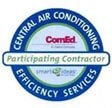In towns like Plainfield, a furnace installation means comfort and reliability during our lengthy Chicagoland winters. Sooner or later, every old furnace needs replacing, no matter how well it may perform or how long. Installing a new one is not a light undertaking, but it offers numerous advantages, and there comes a time when those advantages easily outweigh the initial cost of a set-up. “When should I install a new furnace?” you ask. The answers vary by homeowner, but it boils down to a question of money saved.
Older furnaces tend to be less efficient furnaces. Parts wear out, components need to be replaced, and even the most well-maintained unit will start to lose heating potential to waste and inefficiency. You can spot signs of trouble if your heating bill increases significantly, even though you’re not using your furnace any more than you normally do. A more formal measurement comes with the unit’s AFUE (annual fuel utilization efficiency) rating, which is normally higher in newer units than older ones. (The EnergyStar sticker is given to gas furnaces of AFUE 95% or higher and oil furnaces of AFUE 85% or higher, making it a handy guide to finding a more efficient furnace.)
You might also decide to install a new furnace if repairs on the old one rise higher than you’re willing to tolerate. Every furnace needs repairs sooner or later, but if the frequency of repairs and/or their escalating costs keep climbing, it may be more worthwhile to install a new unit. New units tend to be protected by warranties, and with regular maintenance and upkeep will last quite a long time. Moreover, the energy saved from month to month will help offset the cost of installation, as will the improved resale value your home could enjoy from the addition of a new furnace.
If you’ve answered the question “when should I consider installing a new furnace?” call on the experts at DuAll Heating & Cooling to help. We handle Plainfield furnace installation of all varieties, and our staff operates throughout the southern Chicagland area.
Call us today to set up an appointment












